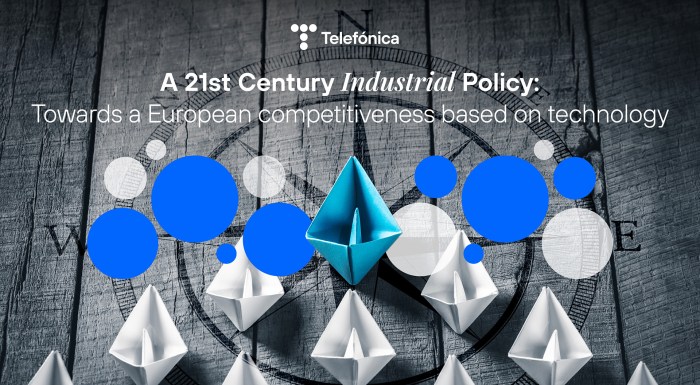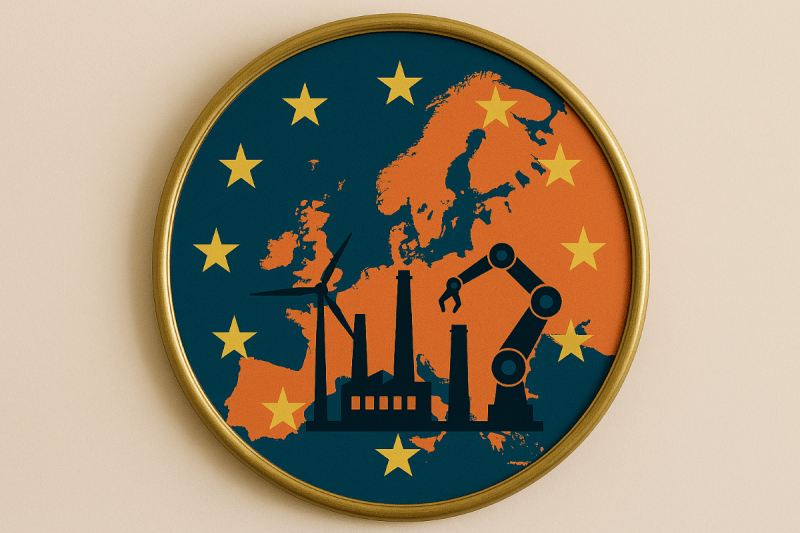Open Strategic Autonomy, the backbone of European industrial policy
Europe’s vulnerability has become evident when the dependencies of its industrial value chains on third countries have had a direct impact on its economy.
Strategic Autonomy has become the new direction for industrial policies to implement a strategy that reduces the potential risks arising from asymmetries in economic interdependencies in the long term. In the digital domain, this involves finding a balance between operating more autonomously in strategic areas and cooperating with third parties to ensure continued access to critical technologies and secure digital supply chains. All of this, based on European standards and values.
In a context of growing relevance of digital autonomy, Telefónica is a key partner for a European industrial policy that promotes this Open Strategic Autonomy.
A 21st Century Industrial Policy
Towards a European competitiveness based on technology.

The strategic relevance of digital autonomy
Beyond energy or semiconductors, digitalization is becoming a critical factor for competitiveness and geopolitics. The global technology race is leading to crucial and sometimes decisive breakthroughs for economies and their autonomy. The development of 5G, AI, quantum computing and the cloud is being framed in a competition between countries that will define the poles of economic leadership in the 21st century, and in which Europe is lagging behind.
Europe is aware that its future competitiveness will depend on its industrial capacity to produce services and products that contribute to successfully achieving the digital and green transitions. And the speed at which economic transformation is driven will make the difference between positioning Europe as a leading region or a strategically dependent one.
It is therefore essential to ensure the strength and sustainability of the technological sectors that have a direct and transversal impact on the competitiveness of industries. From this perspective, the telecommunications sector is a strategic asset.
The telecommunications sector: a key partner
Companies in the telecommunications sector, such as Telefónica, are key partners in shaping a 21st century industrial policy that promotes technology-based competitiveness and reduces Europe’s digital divide.
The deployment of very high-capacity networks is the first step towards effective Strategic Autonomy as connectivity is the foundation of a sustainable and digitally advanced economy. As telecom operators, we deploy future-proof connectivity networks that are essential to drive the development of new technologies and innovative digital services.
Beyond connectivity, our sector offers technological solutions that accelerate the digital and green transition of all companies: boosting the competitiveness, innovation, export and job creation capacity of industries, positively impacting economic growth.
Recommendations for a 21st century industrial policy
At Telefónica, we believe that public policies should reinforce the competitiveness and sustainability of sectors that are key for present and future economic growth in economies that are highly dependent on digitalization. And the telecommunications sector plays an essential role in the European economy.
Therefore, at Telefonica we believe that an effective approach should, first and foremost, promote incentives for investment and innovation in future-proof connectivity networks to ensure adequate return on network investments and necessary resources.

Secondly, it should promote fair conditions for the balanced development and proper functioning of the digital ecosystem, ensuring the sustainability of network investments.
Third, it should recognize telecommunications infrastructure as an enabler of the green transition.
And finally, to promote innovation and competitiveness of European industry based on a comprehensive approach: from public policies that promote R&D to commercialization, including policies that stimulate digital adoption, digital trust, employability, and cooperation for the harmonized development of emerging technologies.


